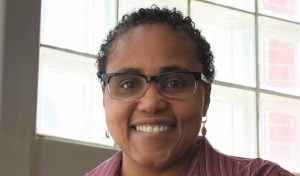The Department is extremely pleased to welcome four distinguished colleagues– – who will join our adjunct faculty and provide career mentorship for students and junior faculty from historically marginalized groups
 Alumna Scarlett Bellamy, ScD ’01
Alumna Scarlett Bellamy, ScD ’01
What is your current position at your home institution?
I am currently Professor of Biostatistics. I also direct our graduate programs in biostatistics for the department and serve as the Associate Dean of Diversity, Inclusion and Faculty Development for the school (public health).
What do you enjoy most about your job?
There are so many things I like about what I do! The variety, the flexibility (particularly useful in a pandemic), advancing science, collaborating and working with students. I also love the idea of shaping what the curriculum in biostatistics looks like for our students, always attempting to balance fundamentals with more contemporary ideas, based on where meeting the needs and anticipating what a competitive skillset will be for the coming generations of trainees.
What research are you currently working on?
I am currently attempting to combine my research and administrative roles. Currently that means focusing on projects that are focused on eliminating health disparities, in a number of contexts, including disparities in various health outcomes, but also disparities in various aspects of the academic experience of different groups which have been traditionally under-represented in biostatistics and in public health.
Where did you grow up? Can you point to something in your life that may have influenced your decision to study biostatistics?
I was raised by my grandparents until I was ~ 10yo, spending nearly equal time with both my maternal and paternal grandparents. My paternal grandparents were farmers and our primary crop was tobacco. So for better or for worse, this now public health researcher has strong, deep roots in tobacco. When I was 5 yo, my grandparents taught me to drive a tractor to help out with harvesting tobacco in summer. It was the hardest work I have ever done in my life and looking back, I wouldn’t trade anything about this experience. It taught me very early on the value of hard work and of making meaningful contributions to my family, even as a small person! I loved it and its kinda cool to say I learned to drive at 5!! I also had a pony and my own 4 wheeled ATV to go exploring whenever I wanted! Another benefit of growing up in the middle of nowhere!
Can you describe your educational and career pathway and any challenges you faced along the way?
I have had more challenges than I can sometimes remember. I feel like every milestone that ‘mattered’, I struggled with somehow. As I have gotten older, I have learned that the strategy that works best for me is to allow myself a limited amount of time to sulk, grieve or otherwise feel bad about it and then to move to making a plan to move on. Otherwise, I can easily get swallowed up in the challenge/failure and paralyzed by it.
How do you feel being Black impacted your educational and career opportunities and experiences?
This is hard. I am always a Black person, most especially outwardly Black. It is not something that I can hide, so it affects everything! I am only aware of the impact of my blackness sometimes.
What’s the biggest lesson you’ve learned or bit of wisdom you can impart to students or junior faculty from historically marginalized groups?
Being a graduate student or junior faculty member is/will be challenging for EVERYONE — it isn’t just YOU. Because it is challenging and most of us do not like to be so open in sharing our struggles and mostly our triumphs, it can seem as though you may be the only one struggling. This is not true! Find someone(s) that you trust and reach for help and support. Oftentimes the solution is knowing a bit more about how to navigate graduate school (i.e., forming study groups, when perhaps you studied solo as an undergraduate; asking for old exams/homework sets from students who were a bit further along in your program) or the competing responsibilities of being a junior faculty member (creating writing accountability groups, time management, active self care). At any professional stage, it is important to identity good mentors (peer and senior) to help you navigate your own professional journey. Finally, if it is helpful to you to frequent various affinity spaces, unapologetically identity or create those spaces for your own mental well-being.
Dr. Bellamy was also recently profiled in Amstat News for their series “A Statistician’s Life, Celebrating Black History Month.



